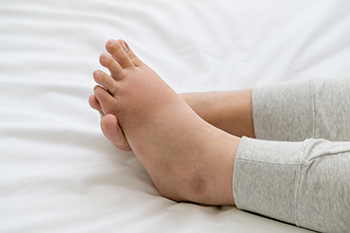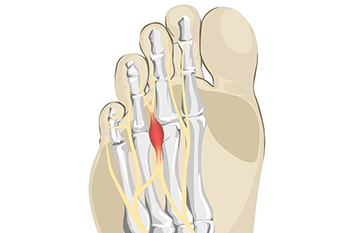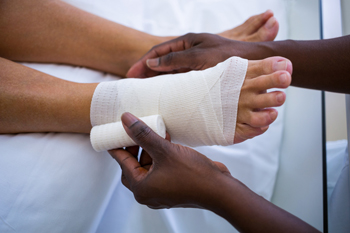Connect With Us
Blog
Items filtered by date: September 2023
Get Professional Care for a Broken Foot or Ankle
Causes and Relief Strategies for Swollen Feet

Swollen feet, a common issue that affects people of all ages, can be uncomfortable and concerning. To find relief, it is essential first to understand the underlying causes. One of the leading causes of swollen feet is fluid retention, often attributed to a sedentary lifestyle, excessive salt intake, or hormonal changes. Prolonged sitting or standing can also impede proper blood circulation, leading to swelling. Certain medical conditions, such as heart, kidney, or liver problems, can contribute to fluid buildup in the lower extremities. Another common factor is inflammation, which can result from injuries, infections, or chronic conditions such as arthritis. In some cases, medications or pregnancy may lead to incurring swollen feet. To relieve swollen feet, elevate your legs whenever possible, ideally above heart level, to encourage fluid drainage. Regular exercise, such as walking or ankle rotations, can help improve circulation. Reducing salt intake, wearing compression stockings, and staying hydrated are valuable preventive measures. If swelling persists or worsens, it is suggested that you consult a podiatrist to rule out any underlying medical conditions and explore additional treatment options.
Swollen feet can be a sign of an underlying condition. If you have any concerns, contact one of our podiatrists of Fox Valley Foot and Ankle Specialists. Our doctors can provide the care you need to keep you pain-free and on your feet.
Swollen feet are a common ailment among pregnant women and people who stand or sit for extended periods. Aging may increase the possibility of swollen feet and patients who are obese often notice when their feet are swelling too. There may be medical reasons why swollen feet occur:
- Phlebitis - A condition that causes the veins to become inflamed and can also cause leg pain.
- Liver disease - This may lead to low blood levels of albumin which is a protein. This can cause fluid in the blood to pass into the tissues and several areas of the body can become swollen.
- Heart failure - When the heart doesn’t pump properly the blood that is normally pumped back to the heart can pool in the veins of the legs causing swollen feet.
- Kidney disease - One of the main functions of the kidneys is releasing excess fluid in the body. This type of condition can make it difficult for the kidneys to function properly, and as a result the feet may become swollen.
- Deep-vein thrombosis (DVT)- This is a serious condition where blood clots form in the veins of the legs. They can block the return of blood from the legs to the heart which may cause the feet to swell. It is important to be treated by a podiatrist if this condition is present.
Swollen feet can also be caused by bone and tendon conditions, including fractures, arthritis, and tendinitis. Additionally, there may be skin and toenail conditions and an infection may cause the feet to swell. Patients who take medicine to treat high blood pressure may be prone to getting swollen feet.
Many patients elevate their feet to help relieve the swelling and this is generally a temporary remedy. When a podiatrist is consulted the reason behind the swelling can be uncovered and subsequently treated.
If you have any questions please feel free to contact our office located in Naperville, IL . We offer the newest diagnostic tools and technology to treat your foot and ankle needs.
Surgery for Morton’s Neuroma

Morton's neuroma is a condition affecting the plantar digital nerve and is common in middle-aged women. Surgical excision is recommended when conservative treatments fail. Various surgical approaches exist, with dorsal and plantar accesses being the most common. Regenerative surgery uses platelet-rich plasma, or PRP, for complications arising from Morton's neuroma surgery. PRP is derived from the patient's own blood. It contains growth factors that aid in tissue healing. Hyaluronic acid acts as a platform for PRP, promoting tissue regeneration and reducing healing time. The combinations of these things offer a valuable technique that promotes complete wound healing, with satisfactory aesthetic and functional outcomes. If you have a Morton’s neuroma that requires surgical intervention, it is suggested that you make an appointment with a podiatrist to discuss whether PRP and HA can be used in the surgery to help with recovery.
Morton’s neuroma is a very uncomfortable condition to live with. If you think you have Morton’s neuroma, contact one of our podiatrists of Fox Valley Foot and Ankle Specialists. Our doctors will attend to all of your foot care needs and answer any of your related questions.
Morton’s Neuroma
Morton's neuroma is a painful foot condition that commonly affects the areas between the second and third or third and fourth toe, although other areas of the foot are also susceptible. Morton’s neuroma is caused by an inflamed nerve in the foot that is being squeezed and aggravated by surrounding bones.
What Increases the Chances of Having Morton’s Neuroma?
- Ill-fitting high heels or shoes that add pressure to the toe or foot
- Jogging, running or any sport that involves constant impact to the foot
- Flat feet, bunions, and any other foot deformities
Morton’s neuroma is a very treatable condition. Orthotics and shoe inserts can often be used to alleviate the pain on the forefront of the feet. In more severe cases, corticosteroids can also be prescribed. In order to figure out the best treatment for your neuroma, it’s recommended to seek the care of a podiatrist who can diagnose your condition and provide different treatment options.
If you have any questions, please feel free to contact our office located in Naperville, IL . We offer the newest diagnostic and treatment technologies for all your foot care needs.
Pressure Ulcers on the Feet

Pressure ulcers are a significant concern in healthcare. These wounds develop due to prolonged pressure on the skin, often affecting individuals with limited mobility or those with underlying health conditions. Pressure ulcers can also result from reduced blood flow to the skin. Any break in the skin caused by pressure can lead to infection. Common infections related to pressure ulcers include localized infections, cellulitis, and osteomyelitis, which can progress to sepsis, a life-threatening condition. Prolonged pressure reduces blood flow to the skin, which can result in tissue damage. Foot pressure ulcers often occur on bony prominences such as the heels and ankles. People using improperly fitted prosthetics, those who wear shoes that rub on various parts of the foot, and people with fragile skin are more susceptible to these wounds. Early detection and treatment are essential for better outcomes. Daily foot checks can help detect pressure ulcers and result in timely intervention. If the skin breaks, vigilance should be practiced for signs of infection, such as pus, foul odor, and increased redness. Once a pressure ulcer forms, treatment includes wound cleaning, protection from pressure, and other medical care depending on the severity of the ulcer. If you have a foot wound, it is strongly suggested that you make an appointment with a podiatrist as quickly as possible for treatment.
Wound care is an important part in dealing with diabetes. If you have diabetes and a foot wound or would like more information about wound care for diabetics, consult with one of our podiatrists from Fox Valley Foot and Ankle Specialists. Our doctors will assess your condition and provide you with quality foot and ankle treatment.
What Is Wound Care?
Wound care is the practice of taking proper care of a wound. This can range from the smallest to the largest of wounds. While everyone can benefit from proper wound care, it is much more important for diabetics. Diabetics often suffer from poor blood circulation which causes wounds to heal much slower than they would in a non-diabetic.
What Is the Importance of Wound Care?
While it may not seem apparent with small ulcers on the foot, for diabetics, any size ulcer can become infected. Diabetics often also suffer from neuropathy, or nerve loss. This means they might not even feel when they have an ulcer on their foot. If the wound becomes severely infected, amputation may be necessary. Therefore, it is of the upmost importance to properly care for any and all foot wounds.
How to Care for Wounds
The best way to care for foot wounds is to prevent them. For diabetics, this means daily inspections of the feet for any signs of abnormalities or ulcers. It is also recommended to see a podiatrist several times a year for a foot inspection. If you do have an ulcer, run the wound under water to clear dirt from the wound; then apply antibiotic ointment to the wound and cover with a bandage. Bandages should be changed daily and keeping pressure off the wound is smart. It is advised to see a podiatrist, who can keep an eye on it.
If you have any questions, please feel free to contact our office located in Naperville, IL . We offer the newest diagnostic and treatment technologies for all your foot care needs.
Causes and Symptoms of Achilles Tendonitis

The Achilles tendon, the body's largest tendon, plays a pivotal role in walking, running, and jumping. When it becomes inflamed or irritated, the condition known as Achilles tendonitis arises. This ailment involves inflammation in two forms, noninsertional and insertional. Noninsertional Achilles tendonitis affects the middle area of the tendon and is more common among athletes and younger individuals. Insertional Achilles tendonitis targets the lower heel area and affects patients of all activity levels. Common factors that contribute to Achilles tendonitis include overuse due to sudden exercise intensity changes and inadequate footwear. Tight calf muscles and diminished ankle flexibility may also strain the tendon. Aging renders tendons less flexible, making middle-aged athletes more prone to Achilles tendonitis. Poor running form and other conditions, like bone spurs or inefficient foot anatomy, can make it worse. Symptoms of Achilles tendonitis include gradual heel pain that worsens over time. Stiffness, tenderness upon waking, and mild swelling around the heel are other symptoms. For help dealing with Achilles tendonitis, it is suggested that you make an appointment with a podiatrist for a diagnosis and the appropriate treatment option.
Achilles tendon injuries need immediate attention to avoid future complications. If you have any concerns, contact one of our podiatrists of Fox Valley Foot and Ankle Specialists. Our doctors can provide the care you need to keep you pain-free and on your feet.
What Is the Achilles Tendon?
The Achilles tendon is a tendon that connects the lower leg muscles and calf to the heel of the foot. It is the strongest tendon in the human body and is essential for making movement possible. Because this tendon is such an integral part of the body, any injuries to it can create immense difficulties and should immediately be presented to a doctor.
What Are the Symptoms of an Achilles Tendon Injury?
There are various types of injuries that can affect the Achilles tendon. The two most common injuries are Achilles tendinitis and ruptures of the tendon.
Achilles Tendinitis Symptoms
- Inflammation
- Dull to severe pain
- Increased blood flow to the tendon
- Thickening of the tendon
Rupture Symptoms
- Extreme pain and swelling in the foot
- Total immobility
Treatment and Prevention
Achilles tendon injuries are diagnosed by a thorough physical evaluation, which can include an MRI. Treatment involves rest, physical therapy, and in some cases, surgery. However, various preventative measures can be taken to avoid these injuries, such as:
- Thorough stretching of the tendon before and after exercise
- Strengthening exercises like calf raises, squats, leg curls, leg extensions, leg raises, lunges, and leg presses
If you have any questions please feel free to contact our office located in Naperville, IL . We offer the newest diagnostic tools and technology to treat your foot and ankle needs.
